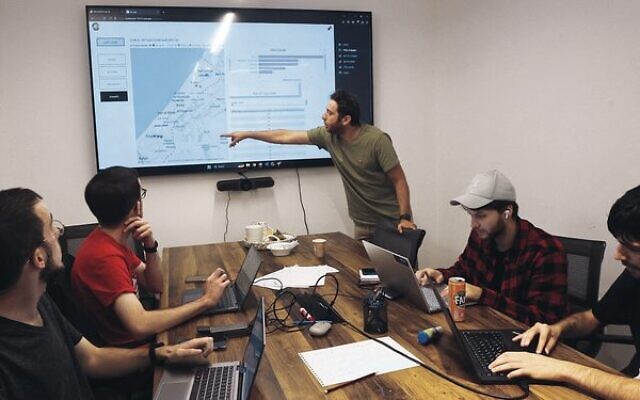Israeli tech workers bring innovation, AI
The tech community's reaction to the hostage crisis represents just a microcosm of the sweeping mobilisation happening across Israel, with young and old volunteering en masse to support affected families, soldiers and a range of other response efforts after the October 7 attacks.
(TIMES OF ISRAEL, AFP) – It looks like any other scrappy Tel Aviv tech start-up, with staff in hip clothing huddled around laptops and downing espressos, but they are the volunteers in a “war room” assembled to help Israel bring home the more than 220 hostages in Gaza.
Within days of Hamas’s rampage on October 7, volunteers from Israel’s tech sector teamed up to lend a hand in the hostage crisis.
“We are a civilian war room. Our main purpose is to save lives,” said Refael Franco, 48, the chief executive of Code Blue, a cyber crisis management firm leading the effort at Gitam BBDO communications group in Tel Aviv.
“We collect. We compare. We deliver,” Franco explained with a brand-ready slogan, as he pored over detailed, digital maps of Gaza dotted with colour-coded markers linked to specific information about the captives.
For years, Israel’s tech sector has emerged as a formative pillar underpinning the country’s economy, with cybersecurity firms in particular serving as a powerful driver of growth and innovation.
Seemingly overnight, volunteers from the sector began meeting at the Gitam group’s offices where they pooled their expertise with artificial intelligence and innovative platforms to assist in identifying the missing in the aftermath of the devastating Hamas attacks.
In this makeshift response centre, volunteers have spent days combing through the deluge of social media posts across myriad platforms to gather information about the captives.
After amassing a database of images from social media in tandem with photos provided by families of the missing and kidnapped, the team then feeds the evidence into artificial intelligence software specialising in facial recognition.
With assistance from experts in geolocating, programmers and Arabic speakers, the team has rapidly pieced together an emerging picture of who was abducted, when they were last seen and where.
The information is then shared with the Israeli military’s special unit overseeing the hostage crisis, with around 60 captives successfully identified by the team to date.
The tech community’s reaction to the hostage crisis represents just a microcosm of the sweeping mobilisation happening across Israel, with young and old volunteering en masse to support affected families, soldiers and a range of other response efforts after the October 7 attacks.
Amid the trauma unleashed by the Hamas massacre, the hostage crisis remains an open wound, fuelling anxiety and uncertainty during what Israeli leaders say will be a long war.
“People here left their jobs. There are CEOs and CTOs and founders of companies that put everything aside and just came here … to help,” said Ido Brosh, a 24-year-old volunteer programmer at Gitam BBDO with expertise in military intelligence.
“It’s horrible that this event made us so unified, but that’s also the beauty of this country. In times of crisis, we come together.”
For Omri Marcus, a creative director working on a campaign to battle misinformation at Gitam BBDO, the project is personal.
Marcus pointed to the wallpaper image on his laptop – a picture of his best friend’s cousin who is among the kidnapped. The photo, he said, serves as a constant reminder of the mission at hand.
“She’s now… in Gaza,” he said. “And we need to bring her back.”


comments